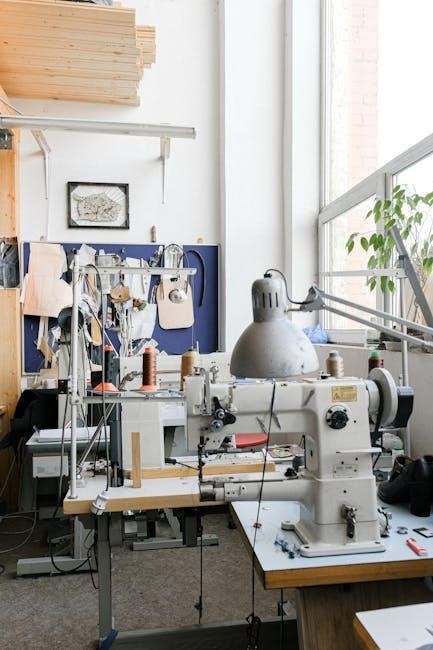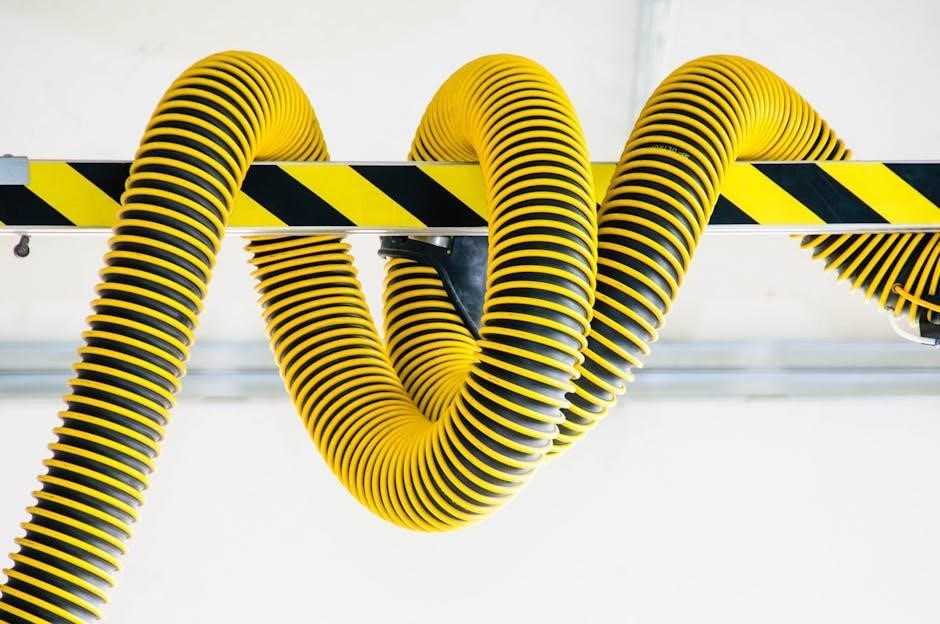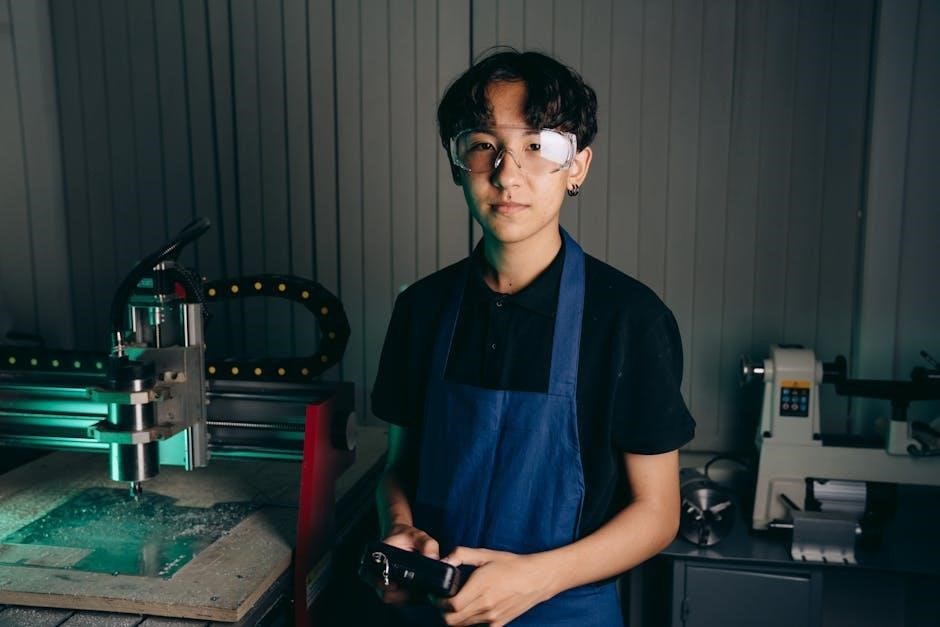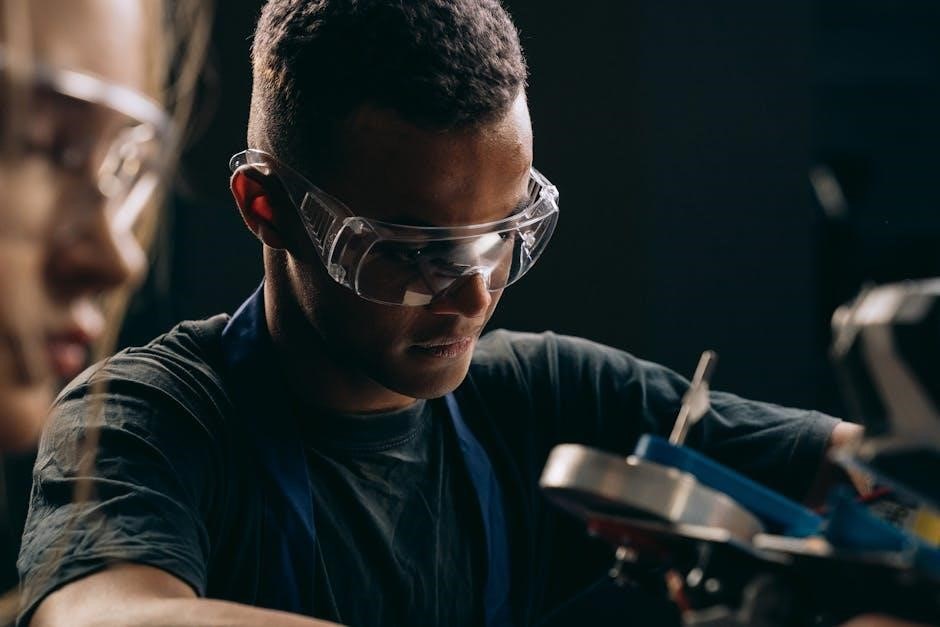
Fundamentals of Modern Manufacturing is a comprehensive textbook covering materials‚ processes‚ and systems in both traditional and advanced manufacturing practices‚ essential for students and professionals alike.
1.1 Overview of the 7th Edition
The 7th edition of Fundamentals of Modern Manufacturing provides a balanced examination of traditional and advanced manufacturing practices. Authored by Mikell P. Groover‚ it explores materials‚ processes‚ and systems‚ offering a comprehensive understanding of manufacturing principles. Published by Wiley‚ this edition includes updated content‚ emphasizing sustainability and technological advancements. It serves as an essential resource for students and professionals‚ blending theoretical insights with practical applications to address contemporary manufacturing challenges and opportunities.
1.2 Importance of Modern Manufacturing
Modern manufacturing plays a pivotal role in driving innovation‚ economic growth‚ and sustainability. It integrates advanced technologies‚ materials‚ and processes to enhance efficiency and productivity. The 7th edition emphasizes the significance of adopting these practices to meet global demands and environmental challenges. By understanding modern manufacturing‚ professionals can leverage its potential to create high-quality products‚ reduce waste‚ and foster sustainable development across industries‚ making it a cornerstone of industrial progress and workforce development in the 21st century.
Key Features of the 7th Edition
The 7th edition includes updated content on advanced manufacturing technologies like AI‚ robotics‚ and smart manufacturing‚ reflecting current industry trends and sustainability practices‚ enhancing student learning.
2.1 Updated Content and Advances in Technology
The 7th edition incorporates the latest advancements in manufacturing technology‚ including artificial intelligence‚ robotics‚ and Industry 4.0. It highlights innovations in materials science‚ additive manufacturing‚ and smart factories‚ providing students with a modern perspective on manufacturing processes. The updated content also emphasizes sustainability and energy efficiency‚ aligning with current industry trends and environmental priorities. These enhancements ensure the textbook remains a vital resource for understanding the evolving landscape of modern manufacturing practices and technologies.
2.2 Enhanced Focus on Sustainability
The 7th edition places a strong emphasis on sustainability‚ addressing green manufacturing practices‚ energy efficiency‚ and waste reduction; It explores eco-friendly materials and processes‚ aligning with global environmental concerns. The textbook highlights the importance of sustainable manufacturing systems‚ providing practical examples and case studies. This focus ensures readers understand the role of manufacturing in achieving environmental goals while maintaining productivity and profitability. Sustainability is integrated throughout the content‚ reflecting its critical role in modern manufacturing strategies and industry standards.
2.3 Improved Pedagogical Elements
The 7th edition incorporates enhanced pedagogical features to improve learning outcomes. It includes updated case studies‚ detailed diagrams‚ and solved problems to clarify complex concepts. The textbook also offers improved organization‚ with clear section headings and summaries. Additional resources‚ such as online study guides and interactive tutorials‚ support student engagement. These elements make the material more accessible and effective for both students and professionals seeking to deepen their understanding of modern manufacturing principles and practices.

Materials in Modern Manufacturing
Modern manufacturing utilizes a wide range of materials‚ including metals‚ polymers‚ ceramics‚ and composites‚ each offering unique properties for specific applications and industries.
3.1 Metals and Alloys
Metallic materials are widely used in manufacturing due to their strength‚ durability‚ and versatility. Steel‚ aluminum‚ and titanium alloys are common‚ offering high strength-to-weight ratios. These materials are essential in aerospace‚ automotive‚ and construction industries. Advances in metallurgy have led to specialized alloys with enhanced properties‚ such as corrosion resistance and thermal conductivity. The 7th edition explores the latest developments in metal processing and their applications in modern manufacturing systems‚ emphasizing efficiency and sustainability.
3.2 Polymers and Plastics
Polymers and plastics are integral to modern manufacturing‚ offering versatility‚ lightweight properties‚ and cost-effectiveness. Thermoplastics and thermosets are widely used in consumer goods‚ electronics‚ and medical devices. Advances in polymer science have introduced high-performance materials like carbon fiber composites and biodegradable plastics. The 7th edition highlights innovations in polymer processing‚ such as injection molding and 3D printing‚ emphasizing their role in driving sustainable and efficient manufacturing practices across various industries.
3.3 Ceramics and Composites
Ceramics and composites are high-performance materials used in demanding applications. Ceramics offer exceptional hardness and heat resistance‚ while composites combine materials for enhanced strength-to-weight ratios. The 7th edition covers advanced applications in aerospace‚ automotive‚ and industrial sectors. It explores modern manufacturing techniques like ceramic injection molding and composite layup‚ emphasizing their role in creating lightweight‚ durable components. These materials are crucial for meeting the performance and sustainability demands of modern industries‚ driving innovation in manufacturing processes.
Manufacturing Processes
Manufacturing processes encompass traditional methods like casting and machining‚ as well as advanced techniques such as 3D printing and additive manufacturing‚ driving innovation and efficiency in production.
4.1 Traditional Manufacturing Methods
Traditional manufacturing methods‚ such as casting‚ forging‚ and machining‚ remain foundational in modern production. These techniques involve shaping materials through processes like melting‚ molding‚ and cutting. Casting creates complex shapes by pouring molten material into molds‚ while forging shapes metal through force. Machining removes material to achieve precise dimensions. These methods are widely used due to their reliability and versatility‚ offering a broad range of applications across industries. They continue to be essential in producing high-quality components efficiently‚ even alongside advanced manufacturing technologies.
4.2 Advanced Manufacturing Techniques
Advanced manufacturing techniques‚ such as CNC machining‚ laser cutting‚ and water jet cutting‚ offer enhanced precision and efficiency. These methods utilize computer-controlled systems to produce complex geometries with minimal material waste. CNC machining automates cutting and drilling‚ ensuring high accuracy‚ while laser cutting provides clean‚ precise edges. These techniques are widely adopted in modern manufacturing due to their ability to improve product quality‚ reduce production time‚ and adapt to customized designs‚ making them indispensable in contemporary industrial applications.
4.3 Additive Manufacturing and 3D Printing
Additive manufacturing‚ including 3D printing‚ revolutionizes production by creating products layer-by-layer‚ enabling complex geometries and customized designs. This technique reduces material waste and allows rapid prototyping. Applications span aerospace‚ healthcare‚ and consumer goods‚ offering unparalleled flexibility. The 7th edition explores its integration with digital tools‚ enhancing precision and sustainability‚ making it a cornerstone of modern manufacturing innovation and efficiency.

Manufacturing Systems
Modern manufacturing systems integrate advanced technologies like CIM‚ FMS‚ and Lean Manufacturing to optimize production efficiency‚ reduce costs‚ and enhance product quality through streamlined processes.
5.1 Computer-Integrated Manufacturing (CIM)
Computer-Integrated Manufacturing (CIM) combines computer technologies to integrate manufacturing processes‚ enhancing efficiency and precision. It encompasses CAD‚ CAM‚ and automation‚ enabling seamless production control‚ reducing errors‚ and optimizing resource utilization. CIM systems improve product quality‚ reduce lead times‚ and facilitate data-driven decision-making‚ making them essential for modern manufacturing environments. The 7th Edition emphasizes CIM’s role in advancing production processes and achieving operational excellence.
5.2 Flexible Manufacturing Systems (FMS)
Flexible Manufacturing Systems (FMS) are modular production systems that integrate automated workstations and robotic material handling‚ controlled by a central computer. They enable efficient production of diverse products‚ reducing costs and improving quality. FMS combines flexibility with high precision‚ allowing real-time adaptation to production demands. This system is widely used in industries like aerospace and automotive for producing complex components‚ ensuring efficient and scalable manufacturing processes while maintaining high standards of precision and reliability.
5.3 Lean Manufacturing and Just-In-Time (JIT)
Lean Manufacturing focuses on minimizing waste and optimizing resource utilization‚ while Just-In-Time (JIT) emphasizes producing and delivering products just in time to meet demand. JIT reduces inventory costs by ensuring materials arrive precisely when needed. Together‚ they streamline production processes‚ enhance efficiency‚ and improve product quality. These methodologies are integral to modern manufacturing‚ fostering a culture of continuous improvement and customer satisfaction‚ as detailed in the 7th edition of Fundamentals of Modern Manufacturing.

Automation in Modern Manufacturing
Automation in Modern Manufacturing enhances efficiency by reducing human intervention‚ utilizing technologies like robotics and CNC machining to enable smart factories‚ boosting productivity and quality.
6.1 Robotics in Manufacturing
Robotics in manufacturing involves the use of automated machines to perform tasks with precision and efficiency. Industrial robots‚ such as articulated and SCARA robots‚ are widely used for welding‚ assembly‚ and material handling. These systems enhance productivity by reducing human intervention and improving consistency. Modern robots incorporate AI and machine learning to adapt to complex production environments. The integration of robotics with CNC machining and smart factories has revolutionized manufacturing processes‚ enabling faster production cycles and higher product quality. This chapter explores the latest advancements in robotic technologies and their applications in modern manufacturing.
6.2 CNC Machining and Automation
CNC machining and automation involve the use of computer-controlled machines to perform precise manufacturing tasks. These systems utilize programmed instructions to fabricate materials like metals‚ plastics‚ and composites. CNC machining enhances accuracy‚ consistency‚ and efficiency‚ reducing human error and production time. Automated CNC systems integrate with CAD/CAM software‚ enabling seamless design-to-production workflows. This technology is essential for high-volume manufacturing‚ offering scalability and adaptability to diverse industrial needs while minimizing material waste and improving product quality. It is a cornerstone of modern manufacturing processes.
6.3 Industrial IoT and Smart Factories
Industrial IoT (IIoT) and smart factories leverage interconnected devices‚ sensors‚ and data analytics to optimize manufacturing processes. These technologies enable real-time monitoring‚ predictive maintenance‚ and automated decision-making‚ enhancing efficiency and productivity. By integrating IIoT‚ factories can reduce downtime‚ improve resource utilization‚ and achieve higher product quality. Smart factories also support sustainable practices by minimizing energy consumption and waste. This digital transformation is a key driver of Industry 4.0‚ revolutionizing traditional manufacturing systems and fostering innovation across industries.
Sustainability in Manufacturing
Sustainability in manufacturing focuses on reducing environmental impact through eco-friendly practices‚ energy efficiency‚ and waste reduction‚ ensuring responsible resource use for future generations while optimizing production processes.
7.1 Green Manufacturing Practices
Green manufacturing emphasizes environmentally friendly production methods‚ minimizing waste‚ and reducing resource consumption. Techniques include using renewable energy‚ recycling materials‚ and implementing sustainable supply chains. These practices not only reduce environmental impact but also enhance operational efficiency and cost-effectiveness. By integrating eco-friendly technologies and processes‚ manufacturers can meet growing consumer and regulatory demands for sustainable products. Green manufacturing is a cornerstone of modern industrial practices‚ ensuring long-term environmental and economic benefits while promoting corporate responsibility and innovation.
7.2 Energy Efficiency in Manufacturing
Energy efficiency in manufacturing focuses on optimizing energy use to reduce consumption and costs. This involves implementing advanced technologies‚ such as energy-efficient equipment and smart grids‚ to minimize waste. Manufacturers also adopt renewable energy sources and process optimization strategies to lower their carbon footprint. Enhancing energy efficiency not only reduces operational expenses but also contributes to sustainability goals‚ aligning with global efforts to combat climate change and promote eco-friendly industrial practices.
7.3 Recycling and Waste Management
Recycling and waste management are critical in modern manufacturing‚ focusing on reducing environmental impact by minimizing waste and promoting material reuse. Techniques include recycling metals‚ plastics‚ and composites‚ while waste management involves proper disposal methods to prevent pollution. Implementing closed-loop systems ensures materials are continually cycled back into production‚ conserving resources and reducing landfill dependency. These practices not only support sustainability but also enhance a company’s environmental responsibility and compliance with regulations.
Design for Manufacturing
Design for Manufacturing (DFM) integrates product design with production processes‚ emphasizing manufacturability and cost efficiency. It utilizes CAD/CAM tools and rapid prototyping to optimize production efficiency.
8.1 Design Principles for Manufacturability
Design principles for manufacturability focus on creating products that are easy and cost-effective to produce. These principles emphasize minimizing complexity‚ selecting appropriate materials‚ and optimizing geometries for production. Key considerations include reducing part count‚ using standard components‚ and ensuring assembly simplicity. Design for assembly (DFA) and design for disassembly (DFD) are integral to these principles‚ aiming to enhance manufacturing efficiency‚ reduce costs‚ and improve product quality. These guidelines ensure designs align with production capabilities and industry standards‚ facilitating smoother transitions from design to manufacturing.
8.2 CAD/CAM and Design Automation
CAD/CAM (Computer-Aided Design/Computer-Aided Manufacturing) systems streamline the design and manufacturing process by integrating digital tools. Design automation enhances productivity by automating repetitive tasks‚ optimizing geometries‚ and improving precision. CAD software enables the creation of detailed 3D models‚ while CAM translates these designs into machine-readable instructions for production. This integration reduces errors‚ accelerates prototyping‚ and ensures consistency between design intent and final products. Advanced CAD/CAM tools also support simulation‚ enabling manufacturers to test designs virtually before production begins.
8.3 Rapid Prototyping and Testing
Rapid prototyping enables quick creation and testing of product models‚ accelerating the development process. Techniques like 3D printing allow manufacturers to produce functional prototypes‚ reducing errors and improving design accuracy. Testing these prototypes ensures that products meet performance and safety standards before full-scale production begins. This iterative process enhances innovation‚ reduces costs‚ and streamlines the transition from concept to final product in modern manufacturing workflows.

Quality Control and Assurance
Quality control and assurance are critical in modern manufacturing‚ ensuring consistency‚ reliability‚ and adherence to standards across production processes and final products.
9.1 Total Quality Management (TQM)
Total Quality Management (TQM) is a management philosophy emphasizing continuous improvement across all organizational levels. It integrates quality principles into every process‚ ensuring customer satisfaction and defect reduction. TQM fosters a culture of collaboration‚ data-driven decision-making‚ and employee empowerment. By focusing on preventive measures and process optimization‚ TQM aligns with modern manufacturing’s goal of zero defects and operational excellence. Its implementation enhances efficiency‚ reduces waste‚ and supports sustainable business growth‚ making it a cornerstone of quality control in contemporary industries.
9.2 Statistical Process Control (SPC)
Statistical Process Control (SPC) is a methodology for monitoring and controlling processes using statistical techniques. It ensures process stability and reduces variability‚ enhancing product quality. Key tools include control charts and process capability analysis. SPC identifies deviations‚ enabling corrective actions to maintain consistent output. It supports quality improvement initiatives and is integral to modern manufacturing‚ aligning with the 7th edition’s focus on advanced quality management practices.
9.3 ISO Standards and Certification
ISO standards and certification are essential for ensuring quality‚ safety‚ and environmental sustainability in manufacturing. The 7th edition emphasizes compliance with global standards like ISO 9001:2015 for quality management and ISO 14001 for environmental management. Certification validates a manufacturer’s adherence to these standards‚ enhancing credibility and market competitiveness. The textbook provides insights into implementing ISO guidelines‚ highlighting their role in achieving operational excellence and customer satisfaction through standardized processes and continuous improvement practices.

Industry Applications of Modern Manufacturing
Modern manufacturing techniques are widely applied in aerospace‚ automotive‚ and consumer goods industries‚ driving innovation and efficiency through advanced materials and technologies as detailed in the 7th edition.
10.1 Aerospace and Defense
Modern manufacturing is pivotal in the aerospace and defense sectors‚ enabling the creation of lightweight‚ high-performance components. The 7th edition highlights the use of advanced materials like titanium alloys and carbon fiber composites‚ which are essential for aircraft and spacecraft. Techniques such as 3D printing and CNC machining allow for precise fabrication of complex parts. Additionally‚ the textbook emphasizes the importance of quality control in ensuring the reliability and safety of these critical systems‚ making it a vital resource for industry professionals and students alike.
10.2 Automotive Industry
The automotive industry relies heavily on modern manufacturing techniques to produce lightweight‚ efficient‚ and durable vehicles. Advanced materials like aluminum alloys and carbon fiber are used to reduce weight while maintaining strength. Automation and robotics play a key role in assembly lines‚ ensuring precision and speed. The 7th edition explores how technologies like 3D printing and CNC machining are revolutionizing part production. Additionally‚ the textbook highlights the importance of sustainability in manufacturing‚ aligning with the industry’s shift toward electric vehicles and eco-friendly practices.
10.3 Consumer Goods and Electronics
Modern manufacturing in consumer goods and electronics emphasizes high-volume production‚ precision‚ and customization. Automation and robotics optimize assembly lines‚ while smart manufacturing integrates IoT and AI for real-time process control. The 7th edition highlights the role of rapid prototyping and 3D printing in accelerating product development. Sustainability practices‚ such as energy-efficient processes and recyclable materials‚ are increasingly adopted. These advancements ensure faster time-to-market‚ reduced costs‚ and improved product quality‚ meeting the demands of a competitive global market.
Resources for Students and Professionals
Students and professionals can access solution manuals‚ study guides‚ online courses‚ and certifications to deepen their understanding of modern manufacturing principles and practices from the 7th edition.
11.1 Solution Manuals and Study Guides
The 7th edition of Fundamentals of Modern Manufacturing offers detailed solution manuals and study guides‚ available in PDF and text formats. These resources provide step-by-step explanations for complex manufacturing concepts‚ aiding students in understanding materials‚ processes‚ and systems. Professionals can also benefit from these guides to enhance their knowledge of modern manufacturing principles and practices. The solution manual is accessible online through various platforms‚ ensuring easy reference for learners seeking to master the subject.
11.2 Online Courses and Tutorials
Online courses and tutorials complement the 7th edition textbook‚ offering in-depth learning opportunities. Platforms like SoundCloud and Google Books provide accessible resources‚ including downloadable PDFs and audiobook versions. These tools cater to both students and professionals‚ enhancing understanding of modern manufacturing materials‚ processes‚ and systems. The flexibility of these resources ensures comprehensive learning and professional development in the field of manufacturing.
11.3 Professional Certifications
Professional certifications in modern manufacturing are essential for career advancement. The 7th edition of “Fundamentals of Modern Manufacturing” is recognized as a key resource for certification programs. Platforms like AbeBooks and Wiley offer access to the textbook‚ supporting professionals in achieving industry-recognized credentials. These certifications validate expertise in manufacturing processes‚ materials‚ and systems‚ enhancing career prospects and industry recognition. They are designed to align with the latest advancements in manufacturing‚ ensuring professionals stay competitive and informed.

Future Trends in Manufacturing
Future trends include Industry 4.0‚ artificial intelligence‚ and smart factories‚ emphasizing digital transformation and sustainable practices to enhance global manufacturing efficiency and innovation.
12.1 Industry 4.0 and Digital Transformation
Industry 4.0 represents the fourth industrial revolution‚ integrating automation‚ robotics‚ and data exchange to create smart factories. This digital transformation enables real-time monitoring‚ predictive maintenance‚ and optimized supply chains. By leveraging technologies like IoT‚ AI‚ and big data‚ manufacturers achieve higher efficiency‚ reduce costs‚ and improve product quality. The 7th edition emphasizes these advancements‚ providing insights into how Industry 4.0 is reshaping manufacturing processes globally‚ fostering innovation‚ and driving sustainable growth.
12.2 Artificial Intelligence in Manufacturing
Artificial Intelligence (AI) is revolutionizing manufacturing by optimizing processes‚ improving efficiency‚ and enabling smarter decision-making. Machine learning algorithms analyze production data to predict maintenance needs and reduce downtime. AI-driven systems enhance quality control by detecting defects in real-time. The 7th edition highlights AI’s role in automating complex tasks‚ streamlining supply chains‚ and enabling personalized production. This integration of AI with manufacturing systems is driving innovation‚ reducing costs‚ and fostering a more adaptive and competitive industry landscape.
12.3 Globalization and Supply Chain Management
Globalization has transformed manufacturing by creating interconnected supply chains‚ enabling companies to source materials and labor globally. The 7th edition emphasizes the importance of efficient supply chain management to maintain competitiveness. Advanced logistics‚ cross-border collaborations‚ and technology-driven solutions are crucial for managing complex networks. This section explores how manufacturers can leverage globalization to optimize production‚ reduce costs‚ and enhance product delivery while addressing challenges like cultural differences‚ trade policies‚ and geopolitical risks.
The 7th edition of Fundamentals of Modern Manufacturing provides a comprehensive overview of manufacturing principles‚ emphasizing materials‚ processes‚ and systems. It highlights the evolution of manufacturing‚ from traditional methods to advanced technologies‚ while addressing sustainability and future trends. This textbook serves as an essential resource for understanding the dynamic nature of modern manufacturing and its impact on global industries.
13.1 Summary of Key Concepts
The 7th edition of Fundamentals of Modern Manufacturing covers essential manufacturing principles‚ including materials‚ processes‚ and systems. It explores traditional methods like machining and casting‚ alongside advanced technologies such as additive manufacturing and automation. Emphasizing sustainability‚ the text discusses green practices and energy efficiency. Design for manufacturability‚ quality control‚ and industry applications are also highlighted‚ providing a holistic view of manufacturing’s role in shaping global industries.
13.2 The Role of Modern Manufacturing in the Future
Modern manufacturing will play a pivotal role in shaping the future through advancements like Industry 4.0 and smart factories. Digital transformation and artificial intelligence will drive efficiency and innovation. Sustainability will remain a key focus‚ with green practices and circular economy principles gaining prominence. The integration of automation and additive manufacturing will enable rapid production of complex products. As global industries evolve‚ modern manufacturing will be essential for addressing challenges and fostering economic growth‚ ensuring a competitive and sustainable future.